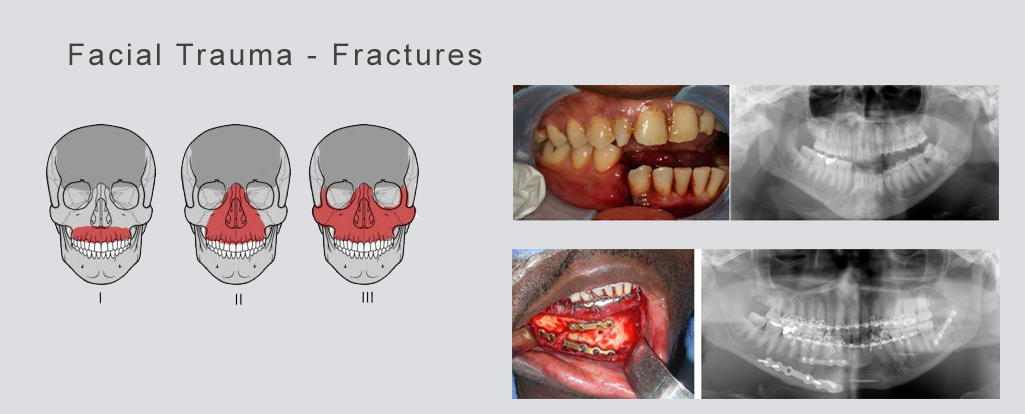-
No.43/2,Middle School Rd,Vishweshwarapura
-
Mon-Sat: 10.00am to 02.00pm
-
And : 04.30pm to 08.00pm
Facial Trauma
Facial trauma treatment in Vishweshwarapura

Facial trauma in dentistry refers to injuries or damage to
the facial structures, including the teeth, jaws, oral
tissues, and surrounding structures, as a result of
accidents, sports injuries, assaults, falls, or other
traumatic events. These injuries can vary in severity and
may require immediate dental and medical attention.
Common types of facial trauma in dentistry include:
Dental Fractures: Fractures or cracks in the teeth can occur
due to a direct blow to the mouth. These fractures can range
from minor chips to more severe breaks involving the tooth's
enamel, dentin, or pulp.
Soft Tissue Injuries: Trauma to the face can cause
lacerations, cuts, or tears in the lips, gums, tongue,
cheeks, or other oral tissues. These injuries may result in
bleeding, swelling, and discomfort.
Jaw Fractures: The upper jaw (maxilla) and lower jaw
(mandible) can fracture due to significant force or impact.
Jaw fractures may cause pain, difficulty in biting or
chewing, misalignment of the bite, and swelling.
Luxation and Avulsion: Luxation refers to the partial
displacement or dislocation of a tooth from its socket,
while avulsion refers to the complete displacement of a
tooth from its socket. These injuries often occur when a
tooth receives a strong impact. Immediate dental care is
crucial to increase the chances of re-implanting an avulsed
tooth successfully.
Temporomandibular Joint (TMJ) Injuries: Trauma to the jaw
joint can cause dislocation, inflammation, or damage to the
TMJ. This can result in jaw pain, limited movement, clicking
or popping sounds, and difficulty in opening or closing the
mouth.
When faced with facial trauma in dentistry, it is essential
to seek immediate medical attention. Dentists and oral
surgeons with expertise in oral and maxillofacial surgery
are usually involved in the diagnosis and treatment of these
injuries. Treatment options may include dental restorations,
splinting, tooth re-implantation, oral surgery, or referral
to specialists for complex cases.
Remember, the information provided here is general, and for
specific advice and treatment options, it's best to consult
a dental professional who can assess your individual
situation.
Looking for the
best facial trauma treatment in Vishweshwarapura?
Then look no fur & visit us today.
